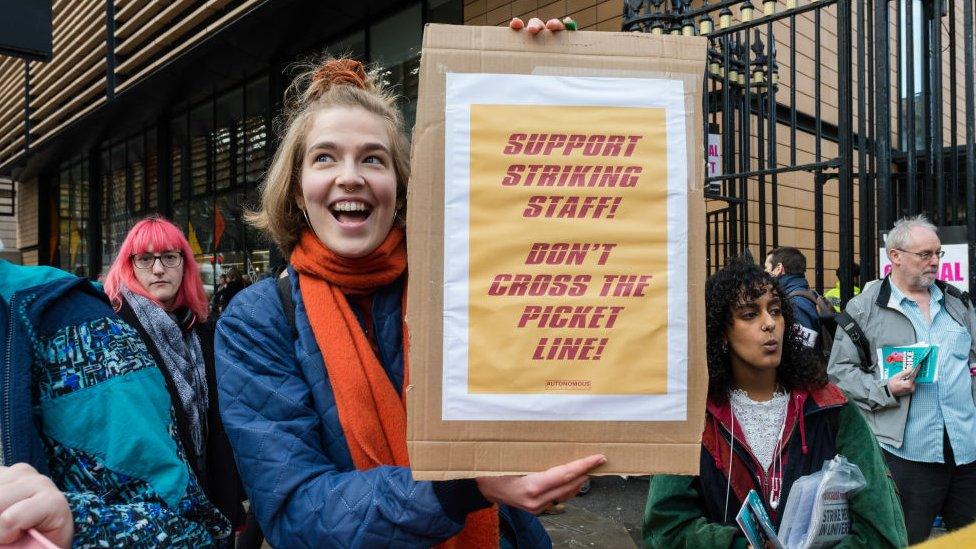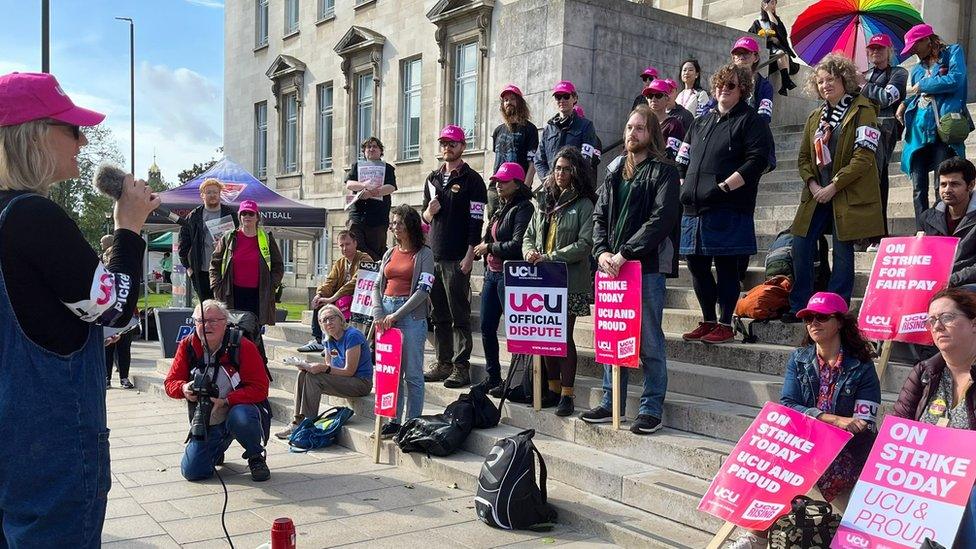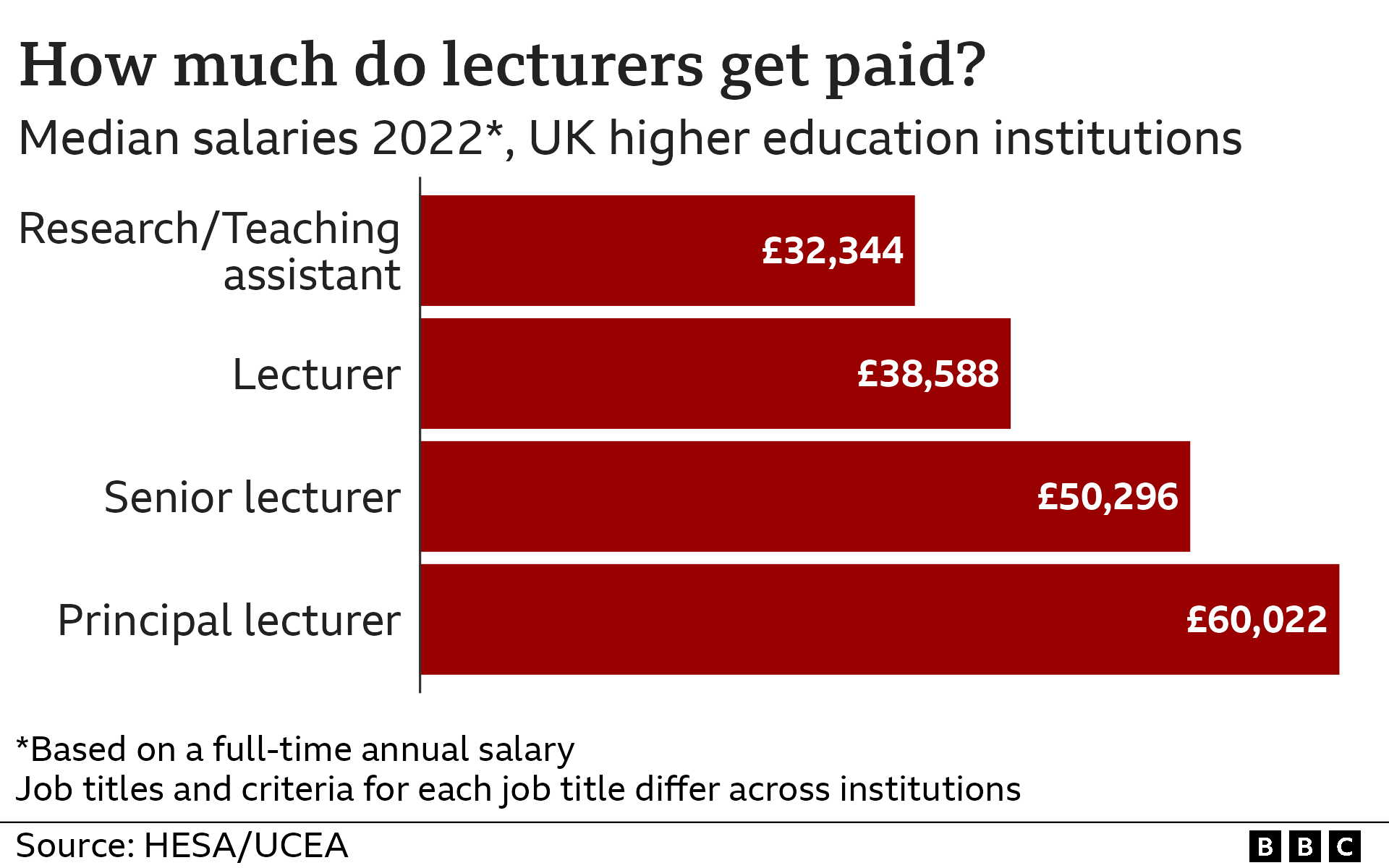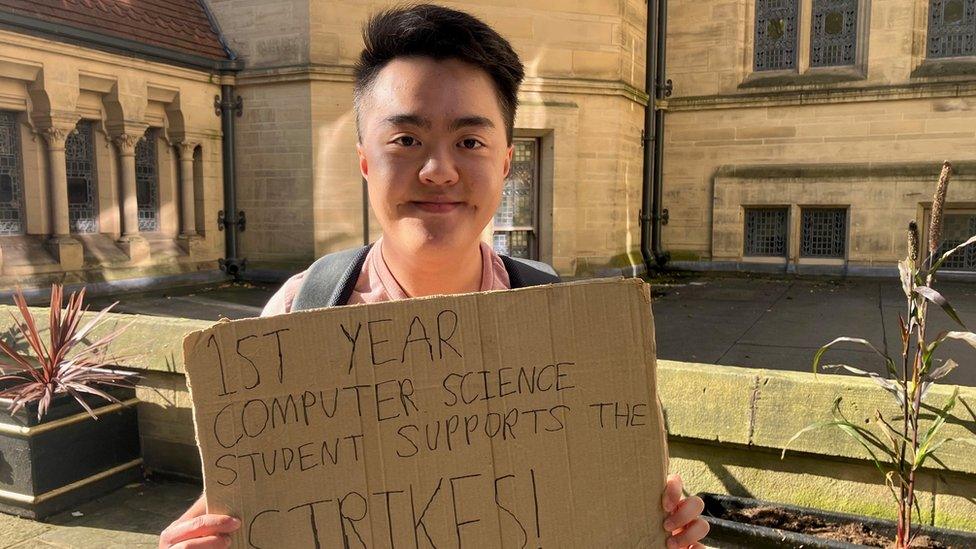UCU strike dates: Which universities are affected?
- Published

Unions estimate that about two-and-a-half million students may be affected by the latest round of strikes
Lecturers and other university staff across the UK took part in five days of strike action in September as part of a long-running dispute over pay and working conditions.
The action by the University and College Union (UCU) at dozens of UK institutions coincided with Freshers' Week for many first-year students.
The union said a long-running dispute over pensions has now been resolved.
Where is the UCU striking?
UCU members at 34 universities were on strike for five consecutive days from Monday 25 to Friday 29 September. Ten more were on strike for one day.
Staff at more than 140 universities were due to take part, according to the UCU.
However, many UCU branches withdrew from co-ordinated strike action after constructive talks with their individual universities where they agreed to stop pay deductions during the marking boycott that took place this year.
Staff at some institutions walked out on slightly different dates to coincide with other local action.
Action short of a strike also continues, which includes staff not covering for absent colleagues, and not rescheduling lectures or classes cancelled because of strike action.
Institutions affected included the University of Leeds, University of Liverpool, University College Birmingham and universities in Edinburgh and Durham.
The UCU has also sent out a fresh ballot to members to renew its six-month mandate for industrial action, which is due to expire at the beginning of October.
If members vote in favour, strikes could continue into 2024.
However, the union has called off a marking and assessment boycott which had been running since 20 April.
This meant some students finished university this summer without knowing their final grade, or were not able to graduate at all.
Will lectures be cancelled as a result of the strikes?
The number of UCU members at each affected institution varies, so the effect will differ according to where you study.
It also depends on universities' individual plans to reduce the impact of industrial action.
In the past, universities have extended coursework deadlines, and tried to reschedule any cancelled teaching, according to Universities UK (UUK), which represents 140 institutions.
The body which acts for the employers in the dispute - the Universities and College Employers Association (UCEA) - said previous UCU strikes led to little disruption.
But the UCU says 70,000 staff took part, and that they were "overwhelmed by the support of thousands of students" who joined picket lines.

What are the UCU university strikes about?
Staff are taking action as part of a long-running dispute over pay and conditions.
The UCU wants a pay rise worth the RPI measure of inflation +2%, and for employers to end the use of zero-hours and temporary contracts.
The UCEA says its improved pay deal for 2023-24, worth between 5% and 8%, was the highest offer of its kind in nearly 20 years.
But unions claim this is a real-terms pay cut, and 56% of participating UCU members voted to reject the offer.
Despite the rejection, the UCEA advised universities to implement the 2023-24 pay uplift, backdated to February.
The UCU says staff have voted to end a separate dispute about pensions after employers agreed to fully restore reduced pension benefits and make other improvements.
How much do lecturers get paid?
Every year, a committee decides on changes to university workers' pay.
Most universities opt in to the negotiations, but they do not have to - institutions can make their own decisions on pay.

The median salary for a professor is about £80,000, according to analysis of Higher Education Statistics Agency, external figures carried out by the UCEA employers' body. Some 25% of professor salaries are at, or below, about £70,000, the UCEA says.
However, the UCU says a third of academic staff are on temporary contracts and are paid by the hour. It says that casual staff receive holiday entitlement based only on the hours they work and have inadequate paid time to prepare for their classes.
Staff titles vary across institutions,, external and universities employ staff on different types of temporary contracts. Some academics say their salaries are substantially less than the figures quoted.

Are you a student who is affected by the industrial action? Email: haveyoursay@bbc.co.uk, external.
Please include a contact number if you are willing to speak to a BBC journalist. You can also get in touch in the following ways:
WhatsApp: +44 7756 165803, external
Tweet: @BBC_HaveYourSay, external
Or fill out the form below
Please read our terms & conditions and privacy policy
If you are reading this page and can't see the form you can email us at HaveYourSay@bbc.co.uk, external. Please include your name, age and location with any submission.
- Published25 September 2023
